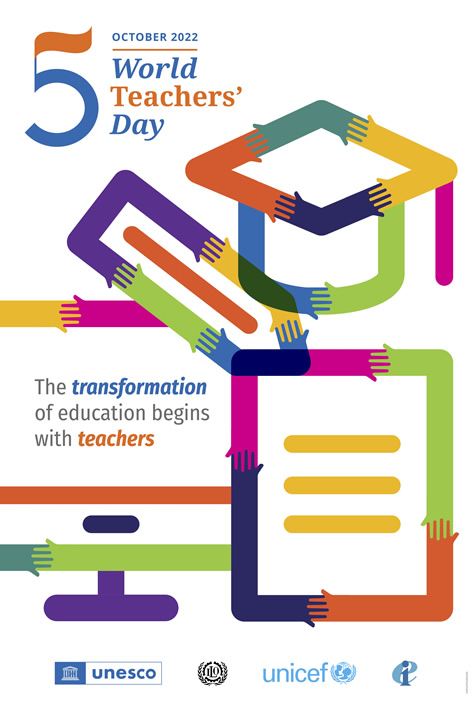« Got a Grudge against a Higher Education institution (especially a Public University) in India? No Problem! University Grants Commission launches Online Grievance Redressal System: e-Samadhaan | Main | Menswear brand JACK&JONES and Bollywood superstar Ranveer Singh team up to break the rules of fashion with DON'T HOLD BACK 3.0 »
October 6, 2022
World Teachers' Day: UNESCO alarms about the global teacher shortage crisis.

Paris, October 5, 2022 — On World Teachers’ Day, Audrey Azoulay, Director-general of UNESCO, called governments worldwide to step up their support for teachers, warning that the profession is struggling to retain its workforce and attract new talent. Worldwide, 69 million teachers are needed to reach universal primary education by 2030.
UNESCO’s estimates indicate the need for an additional 24.4 million teachers in primary education and some 44.4 million teachers for secondary education to achieve universal primary education by 2030.
New UNESCO figures unveiled for 2022 World Teachers’ Day show that, in sub-Saharan Africa, 5.4 million teachers are needed at the primary level and 11.1 million at the secondary level for achieving the targets set by the 2030 Agenda. Southern Asia is the region with the second largest deficit. Here UNESCO projects that 1.7 million additional teachers will be needed at the primary level and 5.3 million at the secondary level.
In low-income countries, the first obstacle is the heavy workload. According to new UNESCO data, each primary teacher in these countries has an average of 52 pupils per class at the primary level, while the global average is 26. The ratio is exceptionally high in sub-Saharan Africa - 56 pupils per teacher - and Southern Asia - 38. In Europe and North America, there are only 15 pupils per teacher on average.
A lack of training amplifies supervision difficulties. In addition, teachers do not always have all the tools at hand to succeed in the classroom. For example, UNESCO data shows that about 26% of primary and 39% of secondary school teachers do not have the minimum qualification requirements in low-income countries, compared to 14% and 16% globally.
Non-competitive salaries also accentuate the vocational crisis. UNESCO data shows that 6 out of 10 countries pay primary school teachers less than professionals with similar qualifications. This criterion is particularly evident in high-income countries. In 5 out of 6 countries in this group, primary school teachers earn less than other comparable professionals. Three high-income countries have a commendable teacher salary policy: Singapore, with an average salary of 139% of similar professions, Spain (125%), and the Republic of Korea (124%).
World Teachers’ Day is held annually on October 5 to celebrate all teachers around the globe. It commemorates the anniversary of adopting the 1966 ILO/UNESCO Recommendation concerning the Status of Teachers, which sets benchmarks regarding the rights and responsibilities of teachers, and standards for their initial preparation and further education, recruitment, employment, and teaching and learning conditions. In addition, the Recommendation concerning the Status of Higher-Education Teaching Personnel was adopted in 1997 to complement the 1966 Recommendation by covering teaching personnel in higher education.
Source: UNESCO
|GlobalGiants.Com|







Edited & Posted by the Editor | 1:55 AM | Link to this Post







